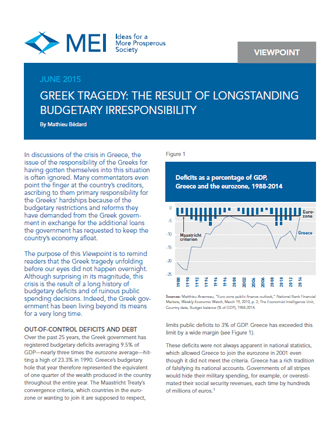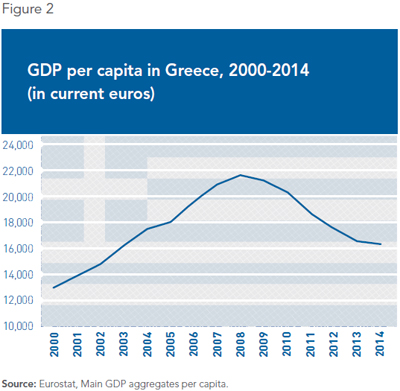Viewpoint – Greek Tragedy: The Result of Longstanding Budgetary Irresponsibility

In discussions of the crisis in Greece, the issue of the responsibility of the Greeks for having gotten themselves into this situation is often ignored. The purpose of this Viewpoint is to remind readers that the Greek tragedy unfolding before our eyes did not happen overnight. Although surprising in its magnitude, this crisis is the result of a long history of budgetary deficits and of ruinous public spending decisions. Indeed, the Greek government has been living beyond its means for a very long time.
Media release: Greek tragedy: Budgetary irresponsibility at the heart of the problem
 Related Content
Related Content
 |
 |
 |
| Greece’s economic lessons for us (National Post, July 14, 2015) | Interview (in French) with Mathieu Bédard (Première heure, Radio-Canada, July 6, 2015) | Interview (in French) with Mathieu Bédard (TVA network, July 9, 2015)
Debate (in French) with Mathieu Bédard (ARGENT business news network, July 6, 2015) Interview (in French) with Mathieu Bédard (LCN news network, June 29, 2015) |
Viewpoint – Greek Tragedy: The Result of Longstanding Budgetary Irresponsibility
In discussions of the crisis in Greece, the issue of the responsibility of the Greeks for having gotten themselves into this situation is often ignored. Many commentators even point the finger at the country’s creditors, ascribing to them primary responsibility for the Greeks’ hardships because of the budgetary restrictions and reforms they have demanded from the Greek government in exchange for the additional loans the government has requested to keep the country’s economy afloat.
The purpose of this Viewpoint is to remind readers that the Greek tragedy unfolding before our eyes did not happen overnight. Although surprising in its magnitude, this crisis is the result of a long history of budgetary deficits and of ruinous public spending decisions. Indeed, the Greek government has been living beyond its means for a very long time.
Out-of-Control Deficits and Debt
Over the past 25 years, the Greek government has registered budgetary deficits averaging 9.5% of GDP—nearly three times the eurozone average—hitting a high of 23.3% in 1990. Greece’s budgetary hole that year therefore represented the equivalent of one quarter of the wealth produced in the country throughout the entire year. The Maastricht Treaty’s convergence criteria, which countries in the eurozone or wanting to join it are supposed to respect, limit public deficits to 3% of GDP. Greece has exceeded this limit by a wide margin (see Figure 1).

These deficits were not always apparent in national statistics, which allowed Greece to join the eurozone in 2001 even though it did not meet the criteria. Greece has a rich tradition of falsifying its national accounts. Governments of all stripes would hide their military spending, for example, or overestimate their social security revenues, each time by hundreds of millions of euros.(1)
Today, the debt amounts to over 177% of Greek GDP.(2) The Maastricht criteria stipulate that a country’s debt should not exceed 60% of GDP.
The Greek economy, before the financial crisis of 2007-2008 and before the yawning chasm of its public finances was revealed in 2009, experienced strong growth. GDP per capita grew by 66% over just eight years during this period, going from 13,000 euros to nearly 22,000 euros a year. Despite the economic collapse of the past few years, it remains higher today than it was in 2000 (see Figure 2).

This strong growth, in part stimulated artificially through the use of debt, was unsustainable. The Greek people are now paying the price for their government’s largesse.
Other European countries have gone through serious crises and have made the necessary sacrifices. Latvia, for instance, was one of the countries most harshly affected by the 2008-2010 economic crisis, but bounced back quickly after reducing public spending by an amount exceeding 15% of its GDP.(3)
Neither European institutions and governments, nor the International Monetary Fund, are responsible for the choices made by the Greeks. They are, however, entirely responsible for their decisions to lend to a government that was never willing to reform itself. Today, Greece’s international creditors are having a hard time finding a way forward, for geopolitical reasons and for fear of creating a precedent that would immediately be exploited by other heavily indebted European countries like Spain and Italy.
Conclusion
The situation that led to the Greek public finance crisis is the result of a long history of budgetary irresponsibility. Out-of-control deficits piled up year after year, and today this accumulated debt has probably become too large to be reimbursed in its entirety. Even with the third bailout announced this week, the Greek people, and the taxpayers of other European countries as well, will unfortunately suffer the consequences of this gross negligence for many years to come. It’s an extreme case that should serve as a lesson for all of those in Quebec and elsewhere who think that debt is not a problem: To really remain in control of one’s destiny, excessive debt must be avoided.
This Viewpoint was prepared by Mathieu Bédard, Economist at the MEI. He holds a PhD in Economics from Aix-Marseille University, and a Master’s degree in Economic Analysis of Institutions from Paul Cézanne University.
References
1. Tony Barber, “Greece condemned for falsifying data,” Financial Times, January 12, 2010; Gunther Hanreich, “Eurostat takes issue with former Greek PM on reasons for the revision of economic data,” Financial Times, December 28, 2004.
2. The Economist Intelligence Unit, Country data, Public debt, 2014.
3. International Monetary Fund, Republic Of Latvia: First Post-Program Monitoring Discussions, IMF Country Report No. 12/171, June 25, 2012, p. 3.

